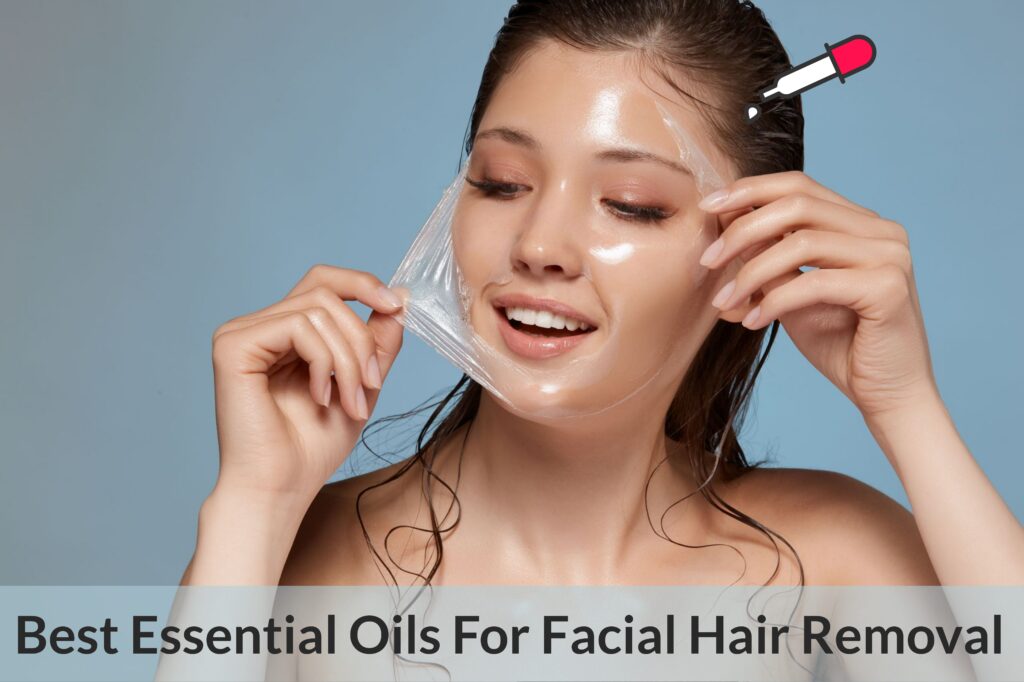
A lot of parts and organs of the human body are termed tough and resilient but hair seldom figure in that list, when in reality they ought to be in the first position.
Come to think of it…there is absolutely nothing out there that the hair on your face and body can’t endure.
You can cut them, pluck them, melt them or electrocute them, do whatever you can and they’ll still come back for more. In fact, I’d go so far as to say that human hair are a confused, masochistic lot. For some reason, they don’t appreciate love.
I mean millions get spent each year on hair oil, shampoos, conditioners, serums, hair masks and more and after all that effort, time and care, the hair on our heads still choose to fall off. In contrast, they do thrive on hate.
All you have to do is take a look at the wiry black abominations springing from your chin or making a spectacle of themselves on your upper lip and then ponder over every painful process that you have been through just to get rid of them.
And what happens after that session of plucking, pulling and agony?
Those pesky and unwanted facial hair come right back to haunt you, sometimes within a matter of days. Unfortunately, modern science offers little reprieve from the unrelenting problem with limited treatment options.
Which brings us to the all-important question: does Nature stand a chance against the vexing problem of facial hair, when all others have conceded defeat?
Well folks, I am Olivia, your essential oil guide, and I will answer that question for you today. But before we start talking about treating the issue, in this case, it is crucial to understand if it is a problem to begin with.
From Normal To Nasty: The Perception About Facial Hair!
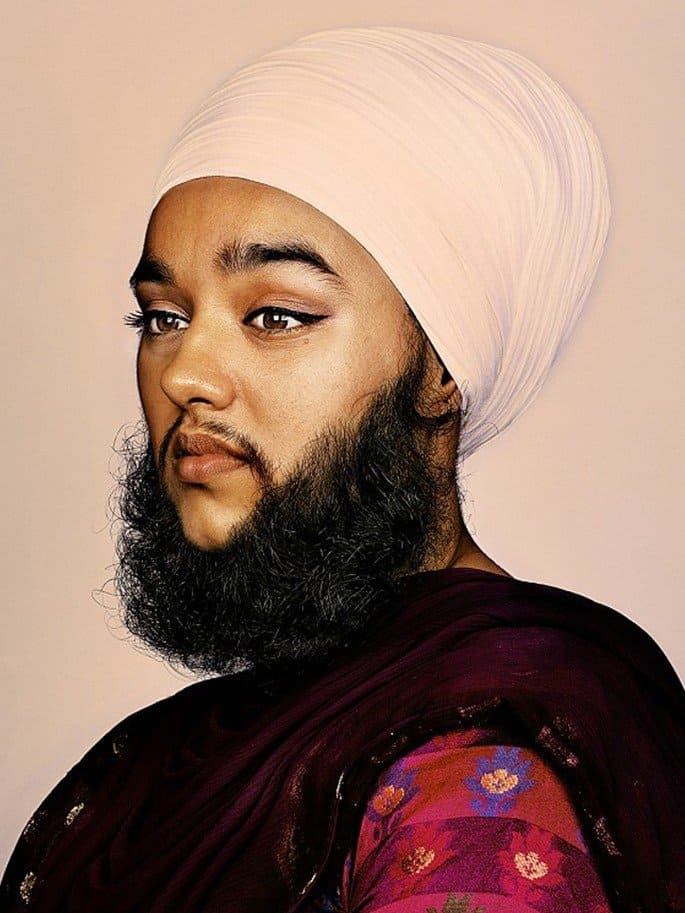
First things first, let me clarify that I am not here to judge you, regardless of how you feel about your facial hair. I know that there are incredibly body-confident women out there, who take pride in all that Mother Nature has given them, like Harnaam Kaur (above photo). Sitting across from them in the “peach fuzz” train are gals who settle for nothing less than smooth and non-hairy perfection.
And then there are the majority of us who take the middle path. The ladies in this group don’t fret the downy growth but do have a problem when the fuzz starts venturing into the Abe Lincoln or Tom Selleck territory.
As far as society goes, the popular perception about hair on a woman’s face and body is far from being positive. But, it’s not the current generation that started this fire; it has been around and burning us since the 1500s, when a Spanish Physician, Juan Huarte, opined that women with facial and body hair are ugly, argumentative and masculine and suffer from infertility problems. The vitriol he spewed centuries ago continues to haunt our collective consciousness to this day.
In fact, such is the disdain for body hair that even products meant to get rid of them feature models with velvety smooth legs, armpits and faces.
So, it’s no wonder that most women consider their hairiness a dirty secret; one that they spend a lot of time and money to hide. Take a look at some mindboggling facts and figures:
- Almost 70% women list unwanted facial hair as their biggest fear.
- More than 50% women lie to everybody, including their partners about the time and effort they invest in keeping their face and body free of hair.
- Ladies spend over 100 minutes every week to rid themselves of facial hair.
- Nearly 70% gals admit to continually checking their face for unwanted hair in the mirror or by touching.
- Facial hair is the cause of clinical anxiety in over 70% women.
- Over 40% women state that unwanted facial hair causes them to feel awkward in social settings.
All these figures do bring out one thing clearly – The society in general and even women have bought into the lie that hair removal is required to live up to the standards of self-care and the popular notion of feminine beauty.
If you ask me, am I pro hair removal? No! Am I against hair removal? No!
For me it all boils down to one simple and non-negotiable principle – get rid of those hair if YOU want to do so and it makes YOU feel better about yourself. Having said that, I am and will remain a vocal critic of any procedure or preparation that has the potential for side effects.
The way I see it is that the benefits should truly and greatly outweigh the risks if you are going to use a treatment that’s a mixed bag. In fact, unless your life is on the line, I’d say try to see if you can work with an alternative. And that is what compelled me to work on this article…
Because The Hair Removal Techniques Out There Are Not For The Fainthearted!
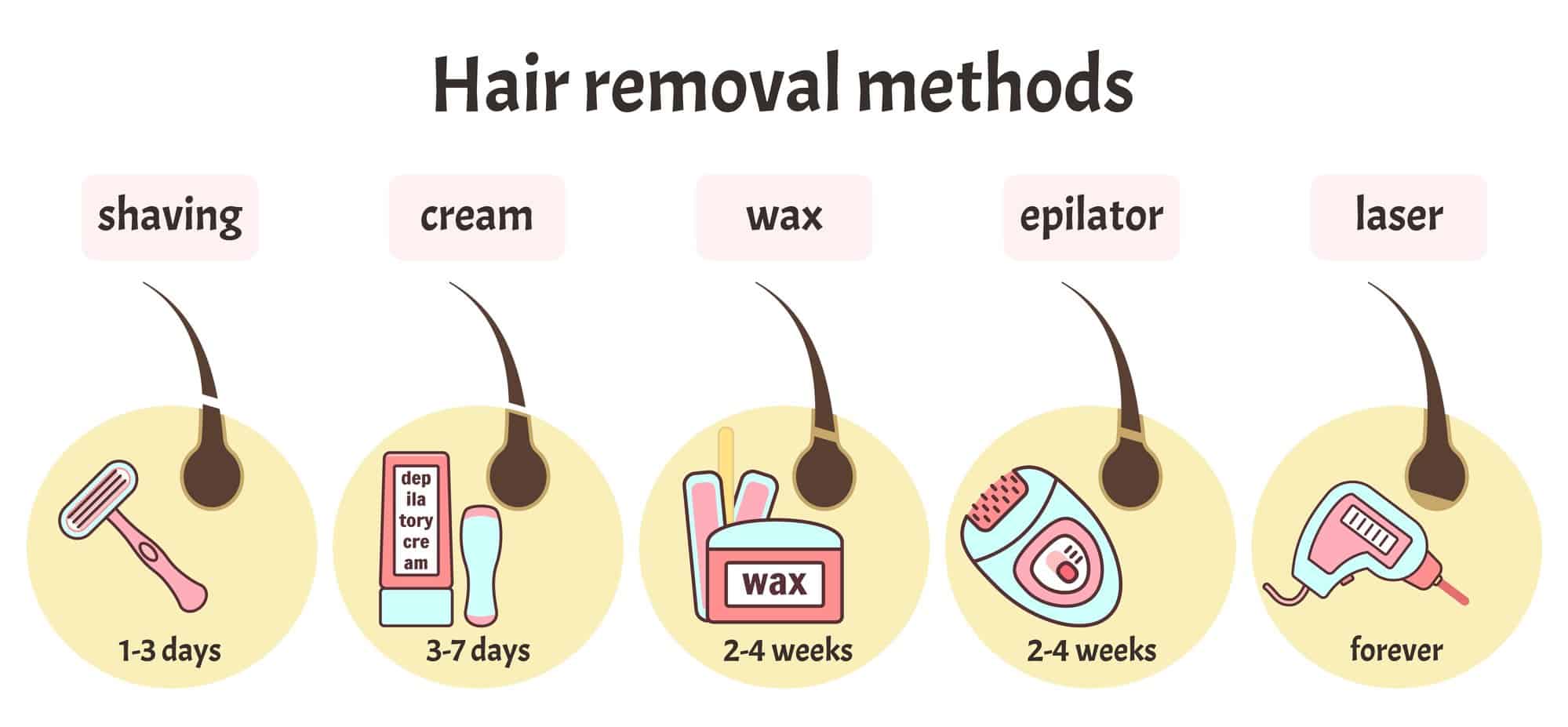
Yes, hair removal as a process of beautification has been around for thousands of years, and its ghastliness hasn’t changed a bit in all that time. The ancient Indians and Egyptians were known to use a paste made from arsenic and other chemicals to kill unwanted hair.
Don’t know if the hair got killed but the ladies using the deadly formulation did end up meeting their Maker sooner than they were supposed to. The 1800s saw the rise of pumice stone and even sand paper to deal with unwanted hair. I suppose I don’t have to tell you that the abrasive tools often removed the skin along with the hair.
At some point, a few wise beauticians reckoned that it made more sense to yank the grass out; never mind how painful the process. I bet waxing, sugaring and threading had something to do with the concept of “Beauty is Pain”. Despite the discomfort, these methods have held on to their popularity.
Now, you’d think that with all the advances in modern science and medicine, things may have changed. Alas! They haven’t.
Hair removal processes remain as painful as ever and mired in side effects. Yes, some do offer longer lasting results than others, but they are far from being as permanent as we’d like them to be. Let me tell you about the available options and the ugly truth about them:
Shaving
This one is almost as old as yanking the hair out and although nobody is using sea shells for the job anymore, the effect offered by the platinum coated, sharp blades have about the same life span. Depending on hair density, color and thickness, you’ll have visible hair growth in 1-3 days.
That said, shaving does not, in any way, impact the darkness or the rate of regrowth. So, they don’t come back darker and thicker, but they do come back. This means, you will have to keep your morning date with a Gillette Mach 3 every 2 days.
Although shaving is not painful if done cautiously; it does not work for everybody. I know proponents of the ol’ razor often throw around names like Cleopatra (Yes, that gal from Egypt) and Elizabeth Taylor (her Hollywood incarnation) and those of other beauties. But, shaving won’t work for you if you have sensitive or acne prone skin.
Also, since the strands of hair are cut at an angle, they tend to be pointier and sharper than the regular face fleece. This can cause irritation and rash. Additionally, if you need to shave every other day, you may end up over exfoliating, depending on your skin type and your age.
Hair removal creams
There is actually a reddit thread dedicated to dealing with vaginal burns caused by Nair, need I say more?
I agree that we are not talking about the hair on your girly bits here nor are we discussing specific depilatories. But, most of these creams have the same chemical composition and the reaction of your skin would be the same, no matter where you use them.
If your skin agrees with these depilatory creams, they can offer a painless, albeit temporary solution for face fuzz. However, be careful about using other cosmetic/skin care products along with depilatories, as the chemicals used in various products often react with each other and lead to adverse effects.
Waxing / sugaring
Call it by any name and use any goey substance, but you are basically pulling the hair out by the dozens using a sticky glue and a strip of cloth.
No points for guessing that the first issue with this hair removal method is the pain it causes. Beauticians will often sell you the lie that over time the pain decreases. Well, it doesn’t. You just cultivate greater tolerance to it, but that’s just your brain.
Your skin may still howl bloody murder after each torturous session. So, it is not surprising to see women nursing redness, rash and pustules after a waxing/sugaring session.
While the inflammation is courtesy of the process itself, infections may become a part of the disaster if hygiene standards are not maintained while yanking the hair out. Moreover, if the wax or sugary glue is too hot, you may end up with a few burns and blisters. Yet, this happens to be one of the preferred choice for many woman.
On the plus side, it is quite affordable and the results do last for 2-3 weeks. Plus, at least theoretically, it is possible that the process may reduce the hair density. Because you are inflicting frequent trauma on the hair follicles, this may, at some point, cause them to die.
Threading
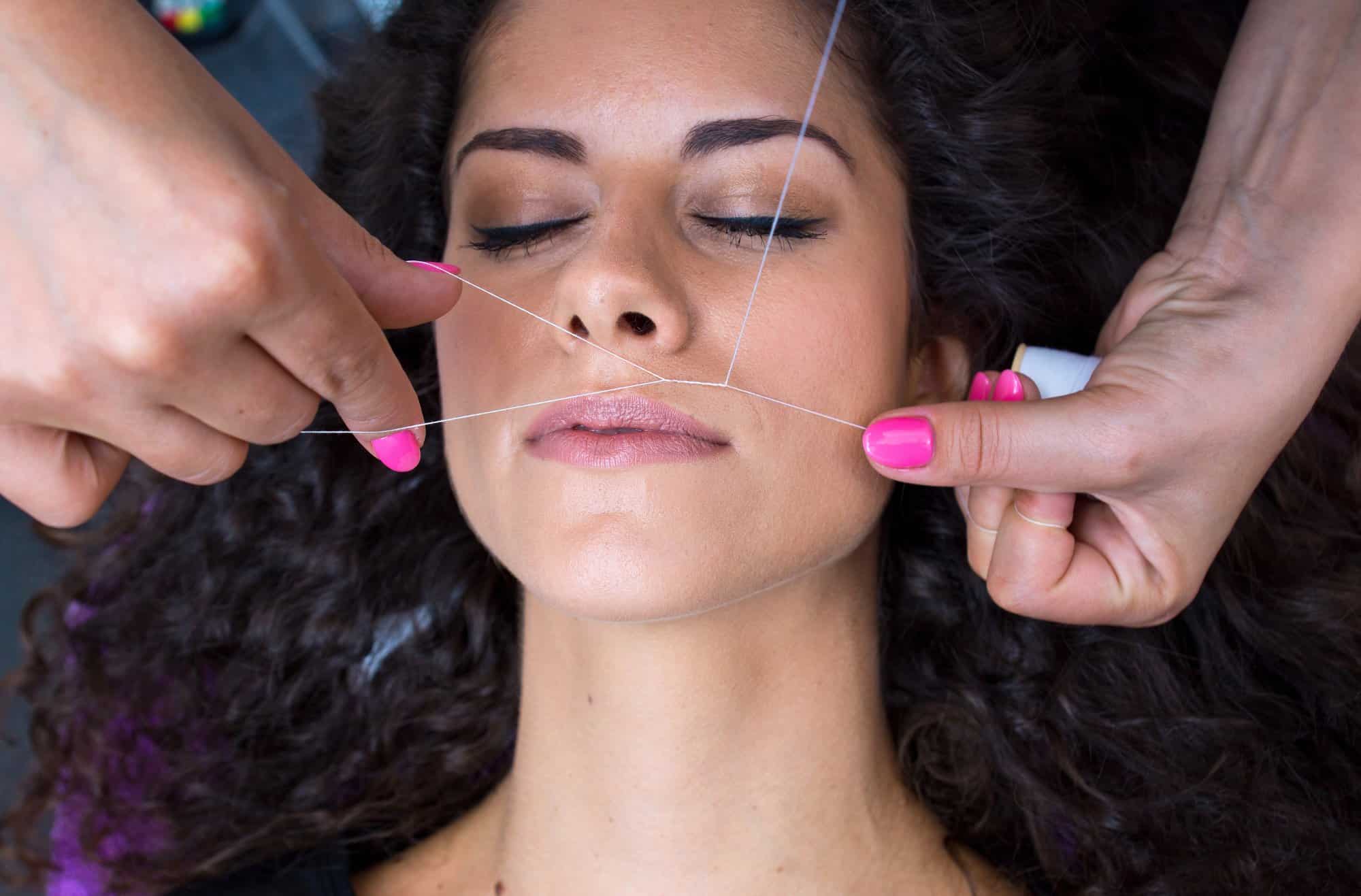
This is just another form of hair pulling that originated in the Eastern world. Instead of cloth strips and wax, hair are yanked out with the help of a thread.
Since the thread is discarded after each session, it is more hygienic than waxing/sugaring but the other risks prevail. So, you may end up with rash, inflammation and even pustules after a threading session. On the upside, it is more suitable for the peach fuzz on the face and even for eye brow shaping.
Epilators
Yes, there is whole class of these devices dedicated to the removal of facial hair. Once again, people tend to sell the idea of gentle hair pulling.
Folks, there is really no such thing as pain-free hair yanking. It doesn’t matter what process or tools are used, when hair gets pulled out, it hurts like crazy. Plus, there is always the risk of inflammation, ingrown hair and rash/pustules, regardless of the device used.
Electrolysis
This happens to be the only FDA approved method for permanent hair removal. The process involves frying the hair follicles through the use of an electric current. Because each follicle is individually targeted, literally by inserting a needle in it, the process is both very painful and time consuming.
Hair have to be targeted while they are still attached to the follicle. Additionally, the follicles have to be subjected to the electric current for the right amount of time. The results are as permanent as possible (more on this ahead) as long as it’s done correctly. But, the process is not well suited for face fleece.
Since the vellus hair on the face is finer, it can be hard to get into each follicle with a needle. Furthermore, there is always the risk of inflammation, burns, skin damage and blisters. But, the biggest problem is that of skin discoloration after the procedure.
Laser
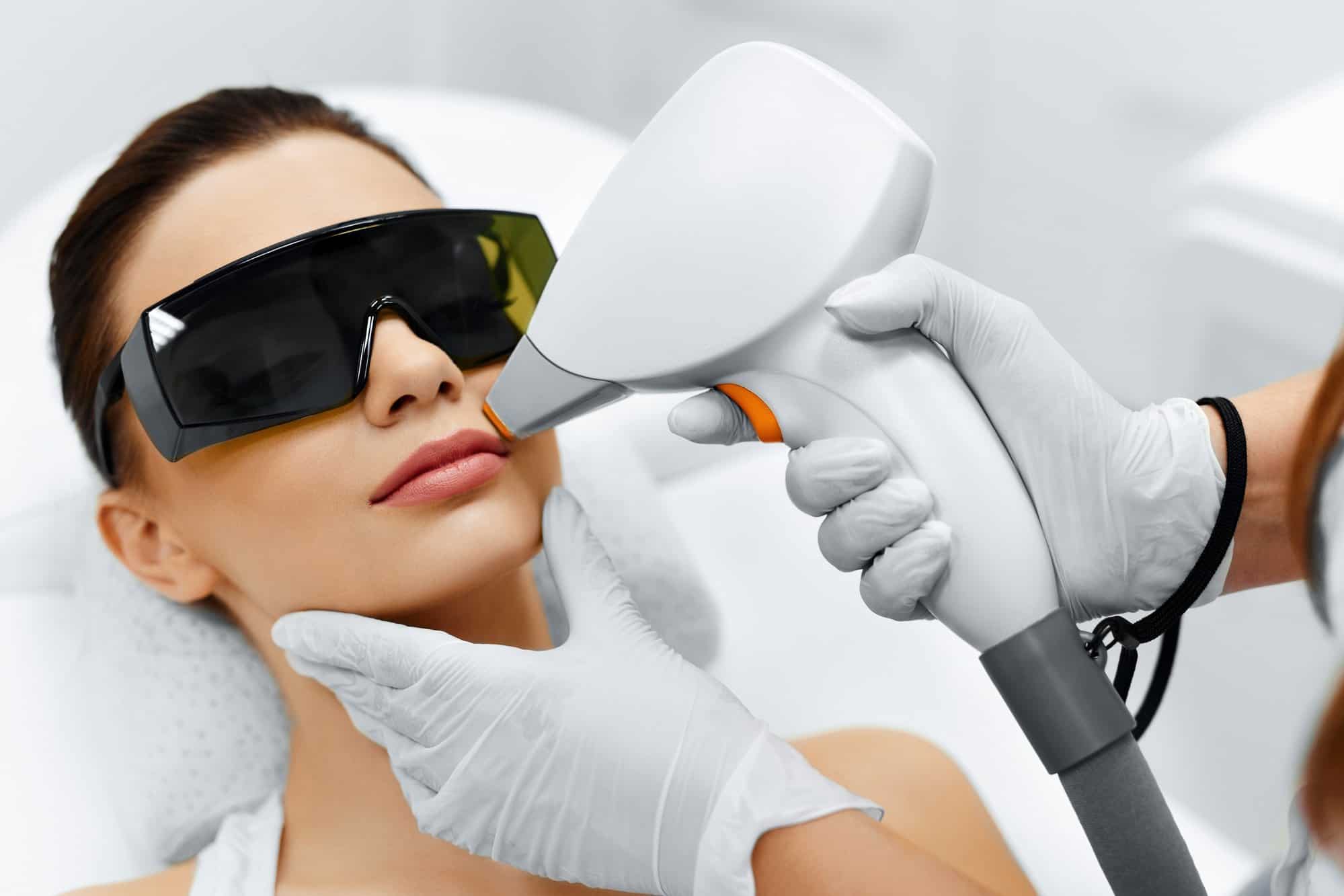
Contrary to perception; the results of laser hair removal are not permanent. At its best and most effective, laser hair removal is a form of hair reduction. The treated hair often make a reappearance after 4-5 years, even sooner if there is hormonal fluctuation involved.
Typically, it takes several sessions to get significant results, and the process is the most expensive of all forms of hair removal. In terms of technique, it is close to electrolysis. However, in this case, a laser is used instead of electric current to destroy the hair follicles.
The use of laser equates to less pain, but it also creates its own issues. For instance, the light seeks out dark hair. So, laser therapy cannot be used on peach fuzz nor will it work if you are dark skinned and there isn’t a lot of difference between your skin tone and the color of your facial hair.
Because the hair follicle is destroyed using the heat generated by the light pulse, the results last for years once they are achieved. However, there are risks such as scarring, burns and blisters to deal with.
Why Are Those Pesky Hair So Damn Resilient?
When you read about all these modern day tortures that double up as hair removal procedures, you are bound to wonder why it’s so hard to get rid of these unwanted hair. For starters, the hair we see on our bodies today are remnants of the fur we sported a couple of thousand years ago.
We lost the fleece midway through our evolution from hominids to present day humans because the problems with the upkeep of the fur far outweighed the protection it offered. Since body hair was meant to offer protection, of course it’s tough and can handle almost everything that you throw at it.
Also, the strength of these hair strands is owed to their growth cycle. Let me explain this further. Human hair can be segregated into two categories:
- Vellus: These are short, light colored/colorless fine hair that can be seen all over your skin, except for on the soles of your feet and your palms.
- Terminal: Generally, when we talk about human hair, we are referring to these dark, thicker and longer hair that can be found on the scalp, the eyelashes, the eyebrows, the axial area, the pubic area and the torso.
Right in between these two main hair groups are intermediate or transition hair which are going from one type to the other. For example, at puberty and at menopause, vellus hair in certain areas transition to terminal hair under the influence of hormones.
In rare instances, there is a bit of reverse movement as terminal hair go back to being vellus. An example of this is androgenic alopecia, a condition in which the larger follicles of terminal hair shrink and become superficial leading to a transformation from terminal to vellus.
Regardless of its type, the life cycle of a hair strand comprises of 3 stages.
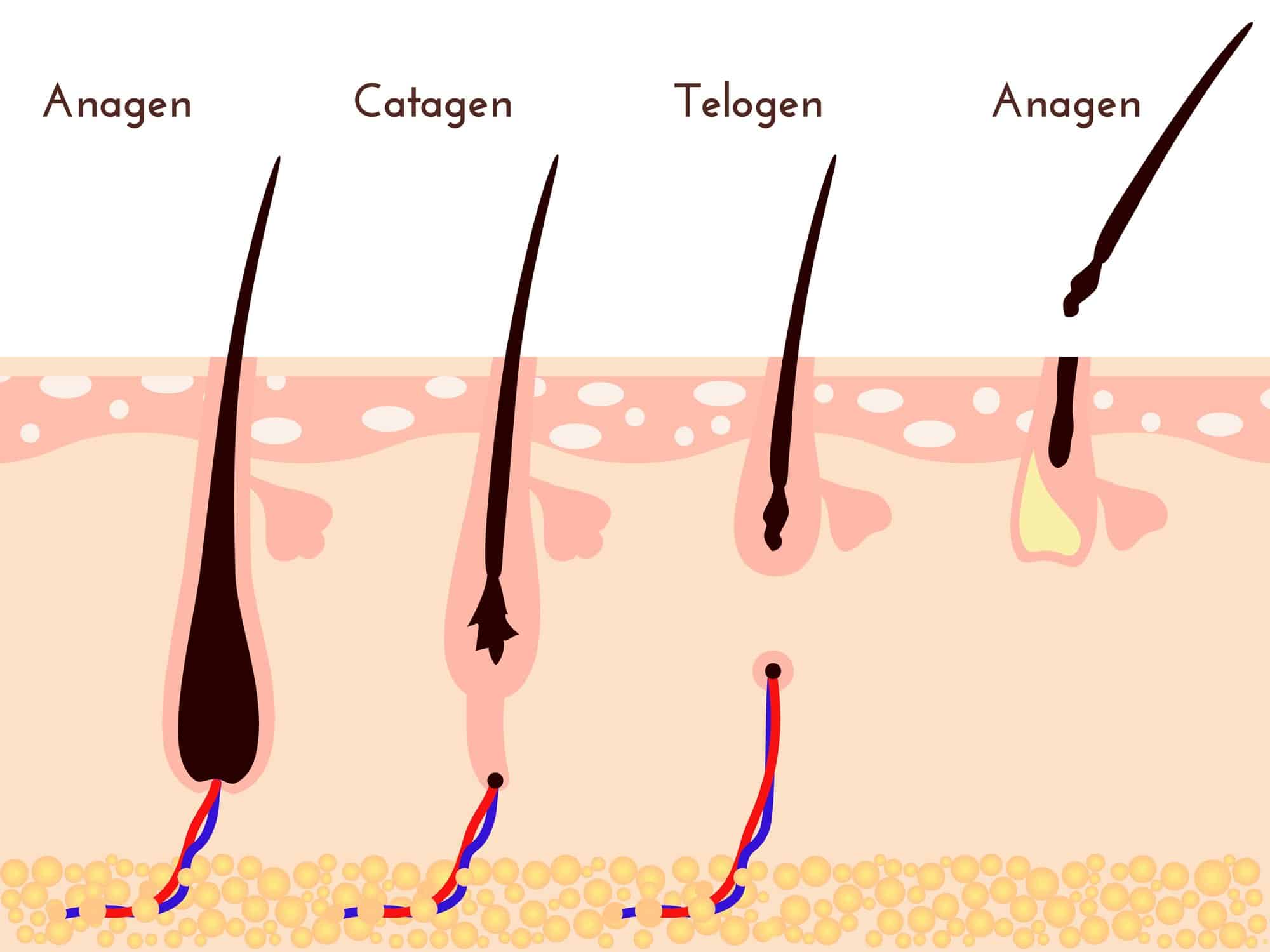
- Anagen: This is the growth phase in which the hair bulb/root is attached to the papilla and receives nutrition from the vascular structure. There is rapid production of keratin that adds to the length of the strand. This is the longest of the 3 life cycle phases and at any given point, nearly 80% of the hair on your body and even on your scalp are in this phase.
- Catagen: Call this the transitional phase, if you will. Little is known about the signal that heralds this phase but what we do know is that the hair follicle shrinks at this stage and detaches itself from the papilla. In other words, blood supply to the hair bulb/follicle gets cut off in the catagen phase and the strand moves up the dermal layers towards the surface of the skin. This is the shortest of the three lifecycle phases.
- Telogen: This is the restorative or regenerative phase that is the second longest of the three. It can also be called the shedding stage. At this point, the hair is dead because it is no longer receiving nutrients from the papilla and it is quite close to the surface of the skin, which allows for it to be shed easily. Of course, the shedding isn’t an immediate process.
For a while the hair in the telogenic phase is held in place by the epidermal cells around the root. But at some point, the follicle gets reactivated and becomes soft, which interferes with the anchoring.
About 10-15% of the hair are in this phase at any given point. Once the hair is shed, the anagen phase begins and the new hair shaft emerges within a matter of days.
As far as hair removal goes, with the exception of shaving, for all other forms, the anagenic phase is the most appropriate. Whether you go with electrolysis, laser therapy or good ol’ waxing, the idea is to damage and possibly kill the papilla or at least create enough scar tissue between the vascular indentation and the hair bulb to starve the hair root and prevent the proliferation of keratin needed for hair growth.
When it comes to shaving, you are simply cutting off the part above the skin without damaging the internal structures in any way. So, the hair strands continue to grow at their usual pace.
Now, causing permanent damage to the internal structures like the papilla and/or hair bulb is hardly an easy process and certainly not one that can be achieved in a single sitting, no matter what procedure you choose.
Plus, there are other factors which influence hair growth and the return of body hair in a certain area. I am going to talk about them in a little bit. But for now, what I am trying to say is that don’t expect to lose those unwanted hair in a week or even a month.
Whether to rid your face/body of unwanted hair or to let them be, is entirely your choice. However, there are times when the appearance of unwanted hair is actually a sign of trouble. This makes it important for us to answer the question:
Is There Such A Thing As “Normal” When It Comes To Facial Hair In Women?
Vellus haircertain areas
Just how dense the coverage is and how dark these hair are depends on a range of factors. From your age to your ethnicity and from genetics to hormone levels and your natural coloring all make a difference to how conspicuous and dense these vellus hair are.
For instance, white women tend to have the lowest density of vellus hair and they are usually colorless. In contrast, Mediterranean and Asian women tend to have vellus hair that are dark enough to be clearly visible even at a distance. Typically, most women have a few dark hair speckling the lighter fuzz.
But if you are LITERALLY growing a beard or a moustache, that ought to be cause for concern. If the hair are dark as those of your eyebrows or like the hair on your scalp, if they grow longer than 2-3 millimeters and you have more than 3-5 hair strands in a 1 square centimeter patch of skin, you should talk to your GP about it.
Why And When Should You Be Concerned About Unwanted Facial Hair?
When you hit puberty, the female hormones in your body make sure that hair in only certain areas of the body go from vellus to terminal. So, you don’t develop the dark, wiry chest hair or a bushy beard like the boys.
But, if this does happen at some point, it is a clear indication of significant hormonal imbalance. Hirsutism, as the condition is known, impacts nearly 10% of women and the ailments that cause this condition include:
- Polycystic ovarian syndrome
- Cushing’s syndrome
- Tumors on the adrenal glands or the ovaries
- Adrenal hyperplasia
- Family history of hirsutism
- Obesity
Corticosteroids, certain antidepressants and drugs used to treat endometriosis may also lead to excessive facial hair growth. So, if you experience a sudden increase in the visibility, length and density of facial hair, it’s best to have it checked.
Is It Even Possible To Truly, Really And Completely Get Rid Of Unwanted Facial Hair Forever?
The best answer to that would be, “sort of”! Let me explain why. At any given point, your skin sports a massive 400 hair follicles per square centimeter. Some of these grow terminal hair but the majority are either inactive or have vellus hair.
Unfortunately, if the conditions are right, the body can always awaken the dormant follicles or transform vellus hair to terminal hair. This means that even if you were to use a technique like electrolysis, which is the only form of permanent hair removal, the hair can always make a comeback.
And this explanation is not specific to just electrolysis. It applies to every hair removal procedure currently known to us, including natural options.
So, Can These Natural Methods Really Help?
Natural preparationshair removal
Another thing I want to clarify is that there is no scientific proof to back the effectiveness of these blends. But, there is plenty of anecdotal evidence that supports their use.
Then again, even if they were to find these natural substances effective in a clinical setting, commercial entities will keep the results under wraps because hair removal is a billion-dollar industry. So, all I can say is that the proof is always in the pudding, so get ready to try the pudding.
The Best Essential Oils And Natural Herbal Ingredients For Hair-Free Skin!

1. Lavender
I have said this before and I will say it again, lavender oil is a true miracle worker that can help you on numerous fronts when dealing with a health or beauty problem. In this case, the anti-androgenic properties of this fragrant oil will come to your rescue.
Apart from this, the ability of lavender essential oil to speed up healing can create a blockage of cells between the papilla and the follicle, once the hair has been pulled out by the root. This would kill the supply of blood to the hair follicle and significantly slow down, if not completely stop, hair regrowth.
2. Tea tree
This camphoraceous oil has a similar mode of action. It is anti-androgenic in nature which means that it keeps the male hormones in check and prevents them from changing vellus hair to terminal hair.
Moreover, the astringent and healing properties of tea tree oil, can help to shrink the hair follicles and slow down regrowth after hair removal.
3. Turmeric
Although there is a long standing debate about the efficacy of this oil in hair removal, it has been the “go to” treatment for all skin related issues, including unwanted hair growth, for centuries. Turmeric owes its ability to prevent excess facial hair growth to its active component curcumin, which is an anti-androgenic substance.
Moreover, it boasts of extraordinary healing powers, which means it’s possible that turmeric oil or even the golden powder derived from the rhizome could bring about rapid dermal healing and regeneration, creating a barrier of scar tissue between the papilla and the hair bulb.
4. Fennel
This is another potent anti-androgenic ingredient that is known to help against a host of hormonal concerns, including unusual hair growth on the face.
The best part is that the fragrant oil also offers a bunch of skincare benefits. It’s a fantastic anti-ageing and skin tightening ingredient. So, you can get hair-free and wrinkle-free skin with this one.
5. Spearmint or tea
This minty oil does not get the level of attention that its cousin (peppermint) commands simply because it doesn’t have as much menthol in it.
But, when it comes to estrogenic effects, it is one of the best oils available in nature. In fact, not only the essential oil derived from the plant but also spearmint tea is often recommended for hormonal imbalance.
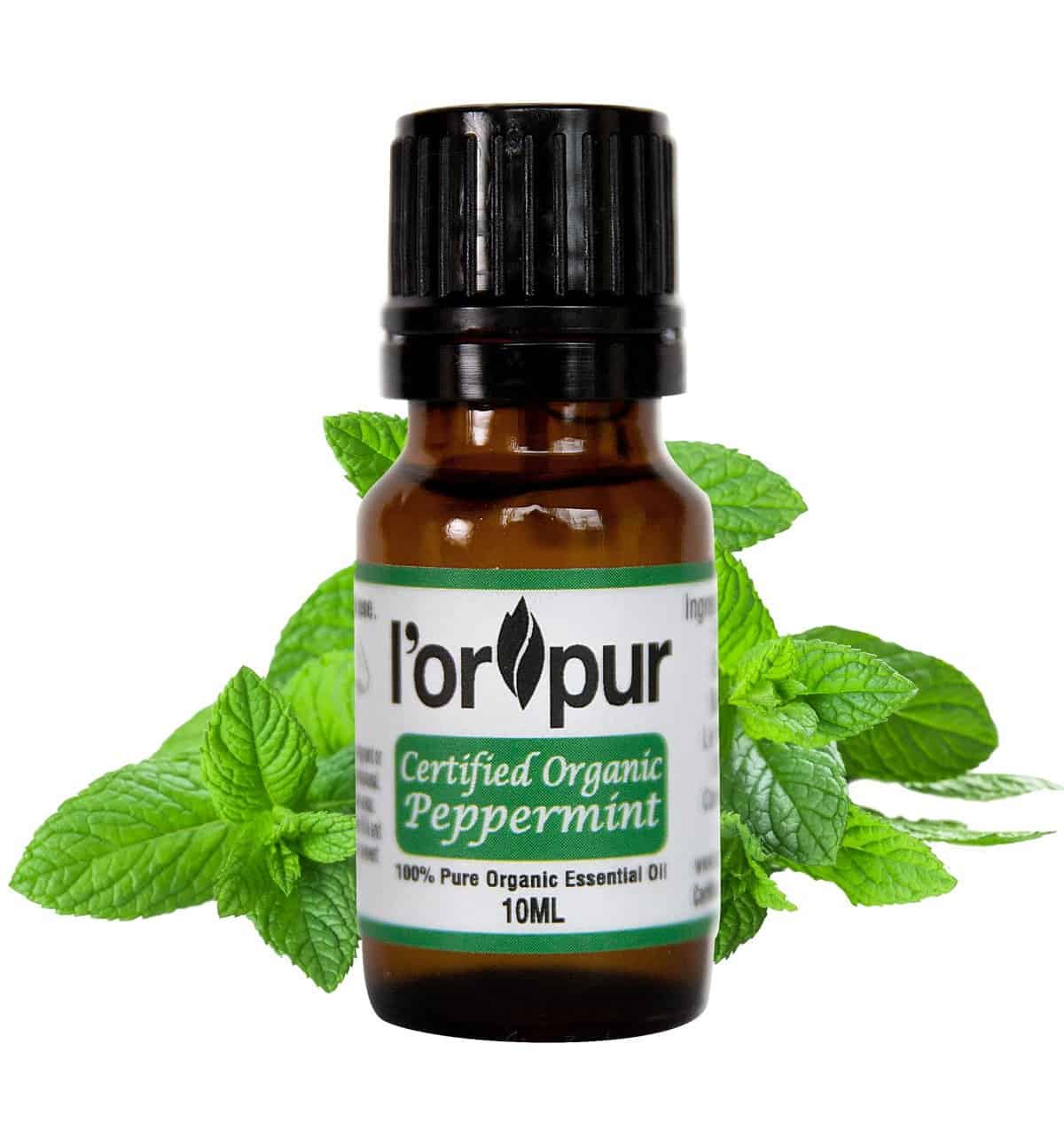
6. Nutmeg
The hot oil is a rich source of myristoleic acid, which is an anti-androgenic agent. It’s known to be extremely effective when used in combination with curcumin and catechins.
7. Nut grass (cyperus rotundus) oil
A new addition to the list of oils that are effective against androgenic hair growth, this ingredient has the backing of clinical studies. In fact, this is possibly the most powerful of all natural treatments for unwanted hair removal.
According to a study published in the Aesthetic Surgery Journal in 2014, this oil is more powerful than Alexandrite Laser epilation for removing both black and white/non colored hair from the axial area (armpits). Now, if this ingredient can easily tackle the coarse, long and dark terminal hair in the armpit, it sure can deal with the comparatively finer hair on your face.
8. Saw Palmetto extract/powder
This is another natural anti-androgenic ingredient that is often used to treat menstrual irregularities. So, if the dark hair on your face are a result of excess androgen, this ingredient can help to reduce the growth of androgenic hair and to prevent the transformation of vellus hair to terminal hair due to androgen activity.
9. Licorice root powder
This phytoestrogenic ingredient is one of the most effective natural treatments for PCOS and its symptoms, including hirsutism. Additionally, it is a purifying agent that help to heal and protect the skin.
10. Manjishta powder (Indian madder)
This herb contains a compound called alizarin, which is also a natural anti-androgenic compound. Plus, like licorice root powder and thanaka powder, manjishta has a long standing reputation as a skin care herb.
11. Thanaka bark powder (Limonia acidissima)
Derived from the bark of massive trees that are indigenous to Burma, India and South East Asia, the yellow-white cosmetic powder has been used for over 2000 years to nourish and protect the skin.
A post on Ayurvedic hair removal methods that mentioned using a paste made from thanaka bark powder and safflower oil, spurred interest in this ingredient the world over.
The reviews for the combination have been mixed. But, I’d still say the combination is worth a shot because thanaka powder offers a range of skincare benefits.
12. Green tea
Gillette had filed a patent for a hair growth retardant product that contained green tea catechins in 1996. Since then, there has been a lot of interest as well as plenty of anecdotal evidence that talks about the effects of catechins in inhibiting unwanted hair growth.
Several studies have shown that green catechins, particularly ECGC, act as 5 alpha reductase inhibitors and blocks the production of testosterone. This effect may play a role in reducing the growth of androgenic hair on the face and in the other areas of the body.
You can purchase the above herbs from Starwest Botanicals.
Get Those Unwanted Hair In Their Follicles With These 7 Natural DIY Recipes
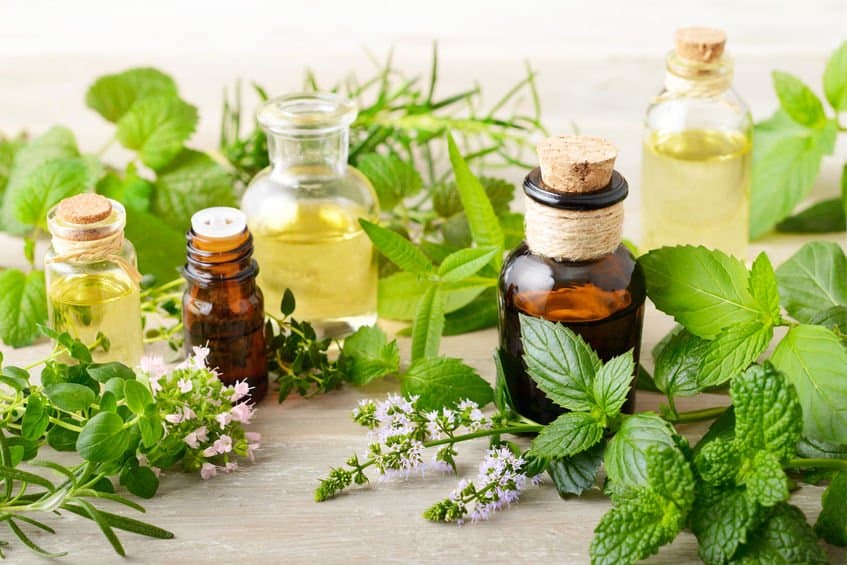
The formulations that I am going discuss here are not depilatory in nature, which means that you will need to start on hair-free skin.
Shaving works in case of some blends but it’s best to opt for waxing/threading or mechanical epilation. Because the hair follicles already get damaged in such processes, you get a cumulative effect when you use the blends after the procedure.
There is no reason why these natural preparations cannot be used after electrolysis and laser therapy. But, it would best to do a patch test because these procedures tend to leave the skin inflamed and more sensitive.
1. After threading/sugaring blend
Ingredients
- Nut grass oil
Method:
Use 2-3 drops of the oil after waxing/sugaring. Massage the oil into the skin for 3-4 minutes and use it every day on the treated parts of the face for a period of at least 6 months. Use the oil immediately after every waxing/threading session. For every day use, cleanse your skin before massaging the oil on areas of excessive hair growth.
2. After shaving blend
Ingredients
- 1 tsp thanaka bark powder (grade A preferred)
- 2-3 tsp safflower oil
- 3 drops turmeric essential oil
Method:
Take 1 tsp of thanaka powder in a small glass bowl and add enough safflower oil to it to form a thick lotion-like mixture. Usually, 2-3 tsp of oil is enough to get the consistency right. Mix well because the powder is very fine and tends to form lumps. Once you have a smooth blend, add the turmeric oil and whisk well.
Use this blend immediately after shaving. You will have to leave it on your skin for at least 3-4 hours. So, when using this recipe, it is best to shave in the evening. This way, you can leave the blend on through the night. You will have to use this mixture at least once a day for 3-6 months for conspicuous results.
3. Hair growth inhibitory spray
Ingredients
- 1 tsp green tea
- 1 tsp spearmint tea
- 1 tsp saw palmetto powder
- 2 cups of water
Method:
Pour the water into a pan and add the botanical ingredients to it. Bring to a boil and then let simmer till the liquid is reduced to 1 cup or less. Remove from heat and cool to room temperature. Under refrigeration, the brew can be stored for 2 days but you will have to wait for it to get to room temperature before use.
It’s best to make a fresh batch every day and pour the concoction into a spritzer-head bottle. Simply spray all over your face, with your eyes closed or apply with some cotton wool as you would any toner. Use this every day, before applying the hair growth inhibiting blend of your choice.
4. Another post waxing/mechanical epilation blend
Ingredients
- 60 ml carrier oil of your choice
- 5 drops each of spearmint and bergamot essential oils
- 10 drops fennel
- 3 drops nutmeg
- 20 drops nut grass oil
Method:
Mix the oils and store in a dark glass bottle. Apply immediately after hair removal and then twice a day for a period of at least 6 months.
5. Face mask for hair removal

Ingredients
- 1 heaped tbsp chickpea flour
- ¼ tsp manjishta powder
- 1 tsp saw palmetto powder/extract
- 1 tsp thanaka bark powder
- 5 drops turmeric essential oil
- Soy milk as required
Method:
Remove the dry ingredients into a glass bowl and add enough soy milk to form a smooth paste that has the consistency of cake batter. Apply all over your skin as you would any face mask. Avoid the skin around the eyes and the eyebrows. Also, don’t get too close to the hairline. Allow the paste to dry on your skin.
Do not wash this mask off as you would a normal product. Instead, you have to rub it off. It does take a bit of effort and you have to work against the direction of hair growth. The idea is to gently scrub the hair off along with the dried paste. It will take you about 8-10 minutes to get it all off. But, DO NOT get impatient and use your nails.
Once done, you can use a face moisturizer to moisturize and tighten skin.
6. A natural scrub that removes dead skin cells and unwanted hair
Ingredients
- 2 tbsp raw honey
- 1 tsp lentil flour (preferably red lentil)
- ½ tsp licorice root powder
- Spearmint tea as required
Method:
Mix the ingredients to prepare a thick paste (toothpaste consistency) and apply on your skin in upward and sideways strokes, working against the direction of hair growth. Don’t press down too hard, instead use gentle strokes and massage for a good 5 minutes. The licorice root powder may cause some amount of stinging.
Unless you feel severe burning, there is no cause for alarm. Wash the scrub off your skin with warm water. This recipe works exceptionally well on fine vellus hair. You can also use it in combination with the other blends to combat androgenic terminal hair growth. Do not use this scrub more than 2-3 times a week. You don’t have to cleanse or exfoliate your face before or after this treatment.
7. A skin healing blend that also helps to prevent unwanted hair growth
Ingredients
- 45 ml carrier oil of your choice
- 10 drops of lavender
- 7 drops turmeric
- 5 drops each of tea tree and spearmint
Method:
Mix the oils and store in a dark glass bottle. To use, apply 2-3 drops after hair removal. Massage the blend into the skin using circular motion. Use at least once every day. This blend will not only help to solve the problem of unwanted facial hair but will also protect your skin from oxidative stress and keep premature skin aging at bay.
You can use it alone or along with any other skin care formulation. If using it with other skin care products, apply this blend first and wait for 10 minutes before using the other product. If using a lighter skin serum, use it after 2-3 hours of applying this oil.
This will give the blend enough time to get through the dermal layers and do its job. Before applying the lighter serum, use the hair growth inhibitory spray to cleanse your skin and then apply the product while your skin is still damp.
The End Word On Peach Fuzz!
There you have it – All the information that you will need to rally the support of Mother Nature in your battle against unwanted facial hair. But before I call it a day, I want to clarify a few things. Whether you choose a man-made or nature-made option for hair removal, three facts to consider are:
- There is no fast way out: At least at this time, we don’t know of any ingredient/chemical/plant or process that can simply make your hair disappear in a day and forever. Head whichever way you want, you will need a few weeks to a few months to get noticeable results.
- Not permanent: A lot of people are willing to be positive about the time taken to achieve the desired results as long as what they get stays for life. Unfortunately, that is not how your body/facial hair work. If I were to give you an analogy, I’d equate hair removal to the game of “whack the mole”. You may get many moles but not necessarily all of them, and those that live will come back with their army to haunt you in the next round. There is simply no getting around this aspect of hair removal.
- Can cause trouble as the hair get thinner: And with that I come to the most jarring of all aspects of hair removal! Most ladies want to rid their skin of hair for aesthetic reasons but this pursuit can lead to another aesthetic problem.
As the hair follicles get strangled, the hair strand gets thinner and has a problem growing out of the dermal layers. This can cause ingrown hair and pustules.
But the good news is that the natural blends with their healing, soothing and antimicrobial powers can keep trouble away. Moreover, not everybody faces this problem, so don’t let this be a deterrent.
After covering all of that, let me lay bare the last and most important bit of truth- Patience, perseverance and diligence are just as relevant to your hair removal success as they are in all other facets of life.
So, don’t let those tiny hair get the better of you, stick with your routine/method and you WILL see results. Plus, now that you have Madam Nature on your side, the journey will be easier and faster.
With that, I wish you all hair free skin all around. In fact, I hope that your gleaming skin is so hair free that it gives Stanley Tucci’s skull a run for its money!
Rating:
Post Views: 14,433
Related posts:
Best Essential Oils and Recipes for Healthy Hair, Hair Loss and Hair Growth Essential Oils For Hair Loss, Hair Thinning And Alopecia Essential Oils For Hair Growth: Reach For Essential Oils When Your Hair Seem To Have Lost The Will To Grow! How To Use Essential Oils To Prevent And Treat Ingrown Hair






































